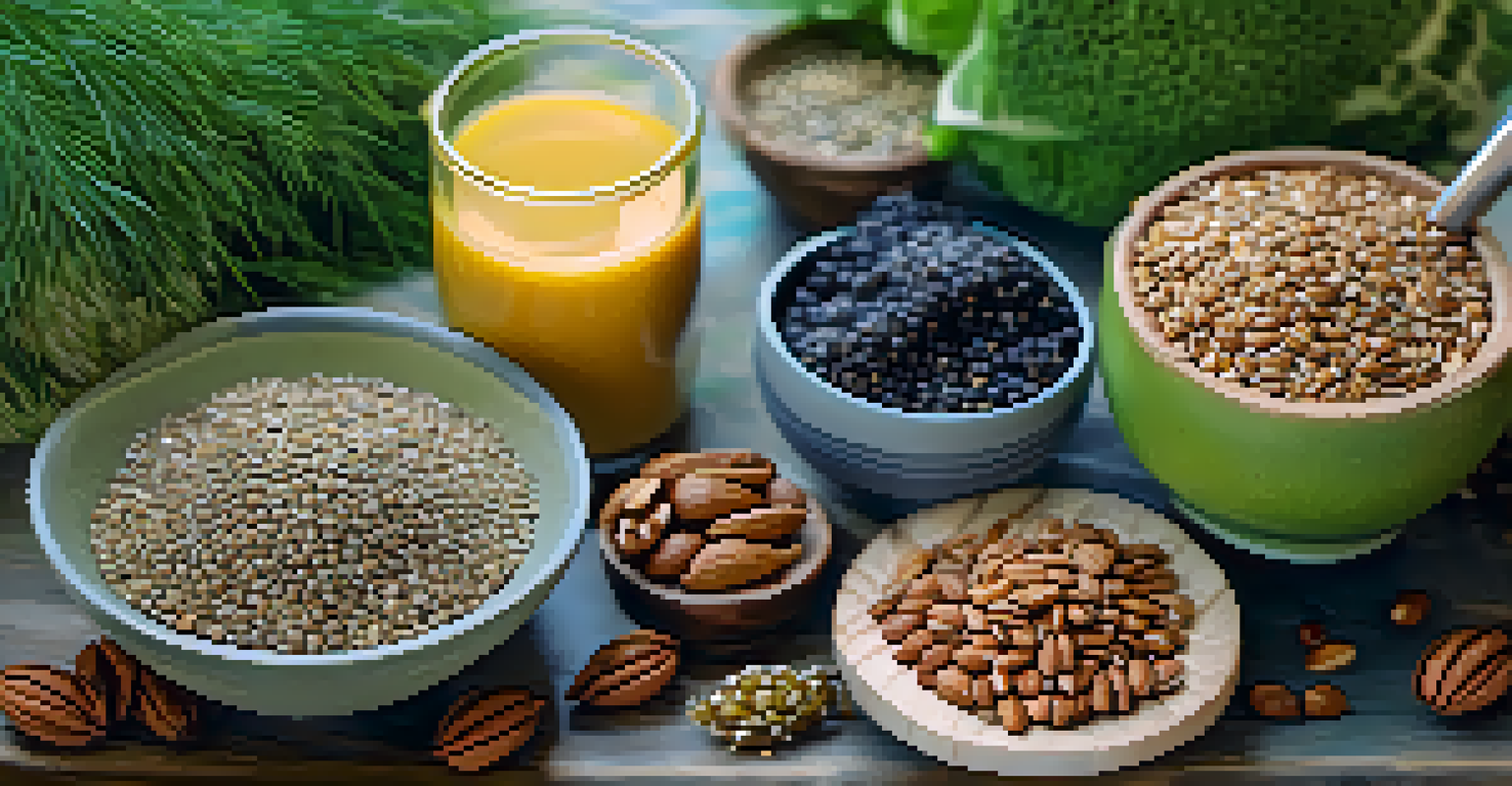The Role of Omega-3 in Vegan Diets for Mental Clarity

Understanding Omega-3 Fatty Acids and Their Benefits
Omega-3 fatty acids are essential fats that our bodies cannot produce on their own. They play a crucial role in brain health, contributing to cognitive function, mood regulation, and overall mental clarity. The three main types of Omega-3s are ALA, EPA, and DHA, with ALA being the one primarily found in plant sources.
Omega-3 fatty acids are essential for optimal brain health and function.
In a vegan diet, getting enough Omega-3 is vital since many traditional sources, like fish, are off the table. This is where plant-based foods come into play, offering alternatives that can supply ALA, the plant-based Omega-3. Foods like flaxseeds, chia seeds, and walnuts are fantastic sources of ALA, helping to bridge the gap in a vegan diet.
Incorporating these foods into your daily meals can enhance your mental clarity, making it easier to focus and think critically. Understanding the importance of Omega-3s sets the stage for exploring how they fit into a vegan lifestyle.
Sources of Omega-3 in a Vegan Diet
Finding Omega-3 sources in a vegan diet is not as challenging as it may seem. Flaxseeds, chia seeds, and hemp seeds are among the richest plant-based sources of ALA. Simply adding a tablespoon of ground flaxseeds to your smoothie or sprinkling chia seeds on your oatmeal can significantly boost your Omega-3 intake.

Walnuts are another excellent choice, offering a tasty snack that doubles as a mental clarity booster. Additionally, seaweed and algae-based supplements provide EPA and DHA, which are usually found in fish. These options can help ensure that you're not missing out on any essential Omega-3s.
Omega-3s Enhance Mental Clarity
Omega-3 fatty acids play a crucial role in supporting brain function, improving focus, memory, and cognitive performance.
By diversifying your food choices, you can easily meet your Omega-3 needs while enjoying a variety of flavors and textures. Embracing these sources contributes to both physical health and mental well-being.
How Omega-3 Supports Mental Clarity
Omega-3 fatty acids are known to support mental clarity by influencing neurotransmitter function and reducing inflammation in the brain. A well-functioning brain relies on a delicate balance of neurotransmitters, which are responsible for sending signals throughout the body. Omega-3s help maintain this balance, promoting better communication between neurons.
The food you eat can either be the most powerful form of medicine or the slowest form of poison.
Research shows that adequate Omega-3 intake is linked to improved memory and cognitive performance. This means that individuals who consume sufficient Omega-3s are often better equipped to focus, retain information, and think critically. In a fast-paced world where mental sharpness is increasingly important, this nutrient becomes a key player.
Additionally, Omega-3s can help combat feelings of anxiety and depression, further enhancing mental clarity. By supporting both emotional and cognitive health, Omega-3s create a solid foundation for optimal brain function.
The Connection Between Omega-3 and Mood Regulation
The relationship between Omega-3 fatty acids and mood regulation is well-documented. Studies suggest that higher Omega-3 intake can lead to lower levels of anxiety and depressive symptoms. This improvement in mood not only enhances mental clarity but also fosters a more positive outlook on life.
For vegans, incorporating Omega-3-rich foods can be a natural way to support mental health. When you feel good mentally, it’s easier to think clearly and tackle daily challenges. Therefore, focusing on Omega-3s can be a simple yet effective strategy for maintaining emotional balance.
Vegan Sources of Omega-3
Plant-based foods like flaxseeds, chia seeds, and walnuts are excellent sources of ALA, the essential Omega-3 fatty acid for vegans.
Moreover, by promoting a sense of well-being, Omega-3s help create a positive feedback loop. When you are in a good mood, your ability to concentrate and process information improves, leading to greater overall mental clarity.
Addressing Omega-3 Deficiency in Vegan Diets
Despite the availability of plant-based Omega-3 sources, many vegans may still struggle to meet their nutritional needs. This is often due to a lack of awareness about the importance of Omega-3s and how to include them in daily meals. Recognizing the signs of Omega-3 deficiency, such as fatigue, mood swings, and difficulty concentrating, is crucial for maintaining mental clarity.
To combat this deficiency, consider meal planning that incorporates Omega-3-rich foods regularly. For instance, starting your day with a chia pudding or adding a handful of walnuts to your salad can make a significant difference. Additionally, keeping track of your intake can help ensure you're getting enough of this essential nutrient.
If you find it challenging to meet your Omega-3 needs through food alone, consider speaking with a healthcare professional about supplements. Algae-based Omega-3 supplements can be a fantastic alternative, providing EPA and DHA without compromising your vegan lifestyle.
The Role of Omega-3 in Overall Brain Health
Omega-3 fatty acids contribute not only to mental clarity but also to overall brain health. Research indicates that these fats play a role in brain structure, helping to build cell membranes and promoting neurogenesis, which is the growth of new neurons. This is particularly important as we age, as maintaining brain health can help prevent cognitive decline.
By integrating Omega-3s into your vegan diet, you are investing in long-term brain health. This proactive approach can lead to a sharper mind and better memory as you grow older. It’s like providing your brain with the essential building blocks it needs to thrive.
Mood Regulation with Omega-3
Higher Omega-3 intake is linked to reduced anxiety and depressive symptoms, fostering emotional balance and clearer thinking.
Incorporating Omega-3-rich foods can create a more resilient brain, preparing it to handle stress and adapt to challenges. This is essential not just for mental clarity today but for sustaining cognitive function in the future.
Practical Tips for Incorporating Omega-3s in Your Diet
Integrating Omega-3s into your vegan diet can be both simple and enjoyable. Start by adding ground flaxseeds or chia seeds to your breakfast smoothies or oatmeal. You can also incorporate walnuts into your salads or use them in baking for an added crunch and nutritional boost.
Another practical tip is to experiment with recipes that feature Omega-3-rich ingredients. For example, try making energy balls with dates, oats, and flaxseeds for a nutritious snack. You might also consider incorporating seaweed into your meals, such as adding nori to sushi rolls or using spirulina in smoothies.

Finally, don't forget to explore algae-based Omega-3 supplements if you're concerned about meeting your needs through food alone. These supplements can help fill any gaps in your diet while ensuring you're supporting your brain health effectively.